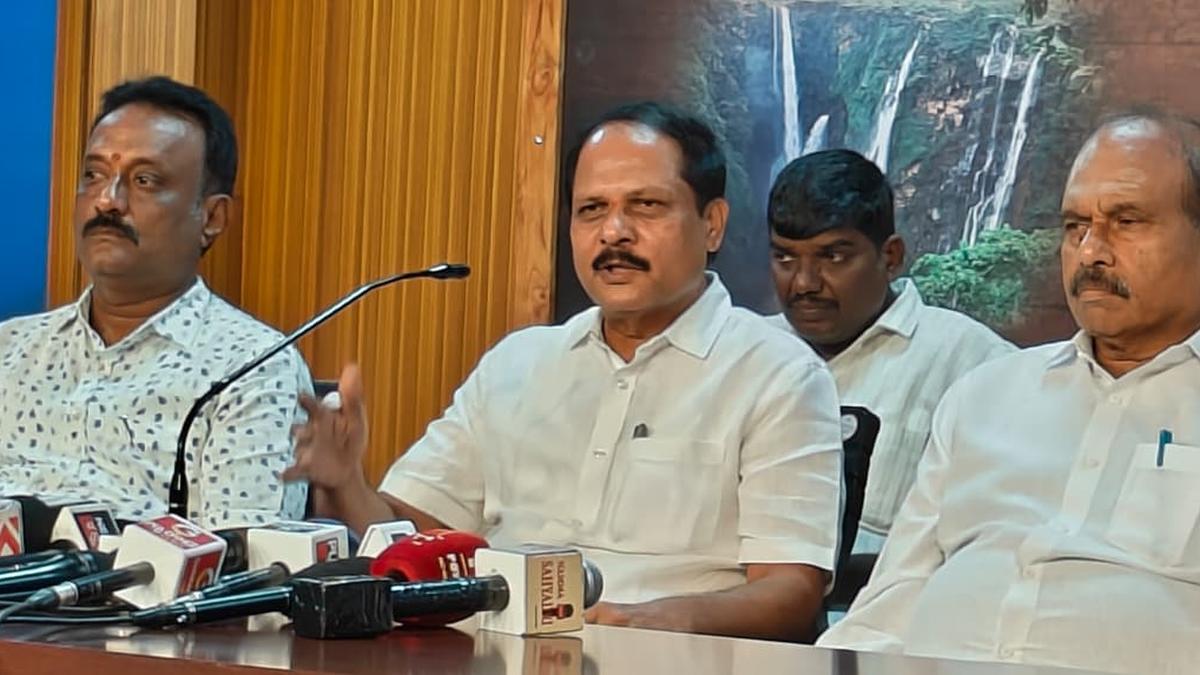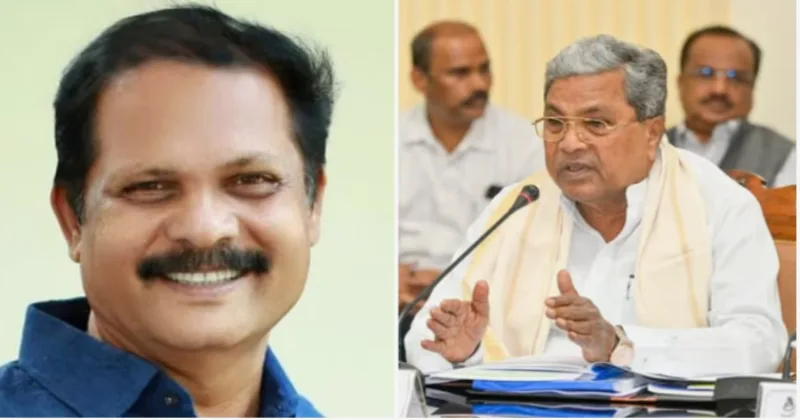The political atmosphere in Karnataka witnessed a dramatic turn after Ravi Kumar, Chairperson of the Karnataka Bhovi Development Corporation, announced that he would resign following serious allegations of corruption. His declaration came during a press briefing where he addressed the mounting criticism and public discontent over alleged irregularities in the functioning of the corporation. The announcement evoked strong reactions across political circles, with opposition leaders demanding accountability and swift investigation.
Ravi Kumar, while maintaining that he had not engaged in any wrongdoing, expressed his willingness to step down to ensure transparency and fairness. He stated that he valued the dignity of his office and did not wish the controversy to overshadow the development work carried out under his leadership. This development marks yet another instance of political turbulence in the state, highlighting the deepening concerns about governance, transparency, and accountability in public institutions. The Bhovi community, which the corporation serves, has been closely watching the unfolding events, anxious about how the allegations and resignation will impact ongoing welfare projects.
The allegations of corruption against Ravi Kumar revolve around accusations of financial mismanagement, irregular allocation of funds, and favoritism in implementing welfare schemes. Reports suggest that certain projects intended for the upliftment of the Bhovi community were either delayed or executed without adequate transparency, raising suspicion among stakeholders. Critics allege that funds meant for community welfare were not reaching beneficiaries in the intended manner, creating resentment and mistrust.
Political opponents seized the opportunity to intensify their attacks, calling for a thorough probe and demanding legal action if evidence of corruption is found. Supporters of Ravi Kumar, however, argue that the allegations are politically motivated, aimed at tarnishing his reputation and weakening the corporation’s initiatives. The controversy has sparked debates about the role of community development corporations, the effectiveness of monitoring mechanisms, and the vulnerability of such institutions to corruption charges. The issue is now expected to escalate further as opposition parties push for legislative scrutiny while civil society groups demand greater accountability.
The Bhovi Development Corporation, established to address the social and economic needs of the Bhovi community, has been instrumental in implementing schemes related to education, housing, employment, and skill development. Under Ravi Kumar’s leadership, several programs were launched to promote self-employment, scholarships for students, and financial assistance for small enterprises. However, the recent allegations have cast a shadow over these initiatives, raising questions about their effectiveness and transparency.
Community members who once saw the corporation as a beacon of hope now fear that the scandal could disrupt ongoing projects and affect the flow of resources. The situation has become a test case for governance, where institutional credibility is at stake. Observers note that if the resignation takes effect, it could pave the way for reforms within the corporation but might also slow down ongoing developmental activities. The developments have ignited larger discussions about the need for transparency, timely audits, and stricter accountability frameworks in public sector organizations dedicated to marginalized communities.
The resignation announcement by Ravi Kumar has created a climate of uncertainty, particularly for the Bhovi community, which has been relying on the corporation for welfare and development programs. Many beneficiaries worry that scholarships, housing projects, and skill-development initiatives may face delays as leadership transitions occur. This has fueled anxiety among students, workers, and families who depend on timely government support. Observers suggest that unless the state government intervenes quickly to ensure continuity, the disruption could weaken trust in not just the Bhovi Development Corporation but in similar institutions designed to uplift marginalized groups across Karnataka.
Political analysts have pointed out that the timing of Ravi Kumar’s resignation has heightened tensions within the ruling coalition. Allegations of corruption, whether substantiated or not, have become a recurring weapon for opposition parties to target government credibility. The Bhovi Corporation controversy has added yet another dimension to the ongoing narrative of corruption in state politics, forcing the ruling party to defend its administrative choices. With elections looming in certain constituencies, leaders now face pressure to prove that institutions under their governance remain transparent and effective. Ravi Kumar’s case has thus turned into a broader test of political accountability.

Civil society groups have been vocal in demanding that the resignation be followed by a transparent inquiry to establish the truth. They argue that resignation, though symbolic, cannot substitute for an independent investigation that can expose systemic weaknesses and recommend structural reforms. Activists insist that the government must set up mechanisms to prevent future lapses, such as regular audits, citizen monitoring committees, and clear reporting standards. Their stance reflects growing impatience among citizens who feel that corruption allegations often fade without meaningful follow-up, leaving institutions vulnerable to repeat scandals.
The Bhovi community itself remains divided over the resignation. Some sections welcome the decision as an acknowledgment of public accountability, while others see it as a setback that risks derailing crucial welfare projects. Community elders and representatives have urged the government to appoint a leader with integrity and experience to ensure that projects continue without delay. They stress that the focus must remain on development rather than political blame games. This sentiment underscores how deeply the episode affects the lives of ordinary people, far removed from the political calculations driving the controversy.
Government insiders indicate that discussions are already underway about who will succeed Ravi Kumar as chairperson. Several names have surfaced, though no official announcement has been made. The process is expected to be closely scrutinized, as the appointment will signal the government’s stance on transparency and reform. Choosing a leader with credibility could help restore public trust, while a politically motivated appointment might deepen skepticism. The upcoming decision is therefore critical, not just for the Bhovi community but also for how development corporations are perceived across Karnataka.
The incident has also affected inter-community relations, as leaders from other marginalized groups are closely observing how the government handles the issue. Many fear that if the Bhovi Corporation struggles under the shadow of controversy, similar institutions serving other communities could face reduced credibility. This could undermine faith in the entire model of targeted development corporations, which are meant to provide tailored solutions to social and economic disparities. The government’s actions in the coming weeks will therefore carry implications far beyond the Bhovi community, potentially shaping policy approaches across the state.

Political Ripples and Public Reactions
The announcement of Ravi Kumar’s resignation has caused ripples in Karnataka’s political landscape, with ruling and opposition parties adopting sharply contrasting positions. Opposition leaders welcomed the decision but emphasized that resignation alone is not enough and insisted on an impartial inquiry into the allegations. They argued that only a transparent investigation could restore public faith in the system and ensure justice for the Bhovi community.
On the other hand, leaders from the ruling dispensation maintained that the resignation was a voluntary act, reflecting Ravi Kumar’s commitment to upholding institutional dignity. Supporters lauded his decision as a responsible step, even as they dismissed the allegations as unfounded and politically engineered. Civil society activists, meanwhile, expressed concern about the adverse impact on beneficiaries, stressing that community interests should remain at the forefront amidst the political tussle. The matter has now become a subject of intense public debate, further polarizing political discourse in the state.
The controversy has also sparked emotional responses from the Bhovi community, which has long relied on the development corporation for targeted welfare measures. Many community leaders expressed disappointment that allegations of corruption have tainted an institution meant to empower marginalized groups. While some welcomed Ravi Kumar’s willingness to resign as an act of accountability, others feared that the episode would derail ongoing projects and delay future initiatives.
The uncertainty surrounding the leadership transition has created anxiety among beneficiaries who depend on scholarships, housing aid, and financial support provided by the corporation. Community voices emphasized the need for continuity in welfare programs regardless of the political fallout, urging the government to safeguard existing schemes. The incident has underscored how corruption allegations and leadership crises can ripple beyond politics, directly affecting the lives of ordinary people who rely on public sector institutions for empowerment and opportunities.
What Lies Ahead for the Corporation
As the resignation of Ravi Kumar looms, attention has shifted to the future of the Karnataka Bhovi Development Corporation. Experts argue that the episode provides an opportunity to overhaul the institution by introducing stronger checks, independent monitoring, and community-driven oversight mechanisms. Political analysts believe that while the resignation may calm immediate controversies, restoring credibility will require more than leadership changes.

Transparent investigations, accountability audits, and reform-driven policies are essential to regain public trust. Beneficiaries and stakeholders are closely watching government actions, hoping that developmental activities will not stall in the wake of the leadership vacuum. The next steps taken by the state government will likely determine whether the corporation can continue fulfilling its mission effectively or whether it will struggle to overcome the shadow of controversy. This turning point could either reinvigorate the institution with reforms or deepen the crisis of faith among the very communities it was established to serve.
Media coverage of Ravi Kumar’s resignation has amplified public interest, with television debates, editorials, and social media platforms buzzing with opinions. While some commentators praise his decision as an act of moral responsibility, others criticize it as a political maneuver aimed at minimizing damage. The saturation of media coverage has ensured that the issue remains in the public eye, adding pressure on both the government and the corporation to act decisively. This media spotlight has also intensified demands for transparency, as citizens expect clear answers rather than vague assurances.
Looking ahead, the future of the Karnataka Bhovi Development Corporation will depend on how swiftly and effectively the government addresses the leadership vacuum, investigates allegations, and introduces reforms. The credibility of the institution is at stake, as is the trust of the Bhovi community. If handled with transparency and urgency, the crisis could become an opportunity for reform and renewal. If neglected, however, it risks deepening disillusionment and weakening the role of development corporations in addressing social inequities. The resignation of Ravi Kumar thus marks not just a political episode but a turning point for community welfare in Karnataka.
Follow: Karnataka Government
Also read: Home | Channel 6 Network – Latest News, Breaking Updates: Politics, Business, Tech & More

